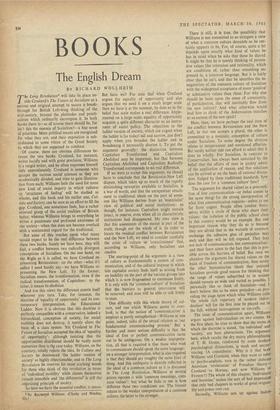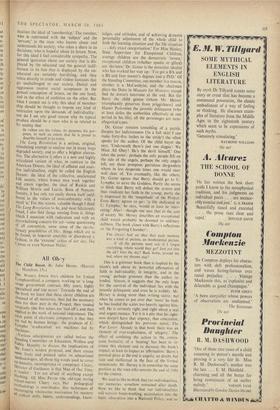BOOKS
The English Dream
BY RICHARD WOLLHEIM
The Long Revolution* will take its place be- side Crosland's The Future of Socialism as a serious and original attempt to secure a break- through for British Left-wing thinking of the mid-century, beyond the platitudes and practi- calities which ordinarily encompass it. In both books there is—as of course there should be, for isn't this the essence of Socialism?—a fine sense of priorities. Mere political means are recognised for what they are, and their exposition is sub- ordinated to some vision of the Good Society to which they arc supposed to conduce.
Of course, there are obvious differences be- tween the two books. Crosland, for instance, writes lucidly and with great precision; Williams is a turgid writer, and he often expresses himself only approximately. Crosland is someone who accepts the various social sciences as they are academically divided, and tries to gain illumina- tion from each; Williams feels the need for some new kind of social inquiry in which cultures or 'structures of feeling' will be studied as wholes, and this book and his earlier one, Cul- ture and Society, can be seen as an effort to fill the gap. Crosland, one sometimes feels, has a rather external grasp of the social realities of Britain today; whereas Williams brings to everything he writes a passionate and profound awareness of our society—when this does not become overlaid with a sentimental regard for the traditional.
But none of this touches upon what many would expect to be the real difference between these two books. Surely we have here, they will feel, a conflict between two radically divergent conceptions of Socialism. On the one hand, on the Right as it is called, we have Crosland re- presenting Revisionism : on the other—what it's called I need hardly say—we have Williams re- presenting the New Left. To the former, Socialism means the transformation, even if the radical transformation, of Capitalism: to the latter, it means its abolition.
And (on this view) the difference asserts itself wherever you turn. Take, for instance, the doctrine of 'equality of opportunity' and its con- temporary interpretation, the Educational Ladder. Now it is obvious that this doctrine is perfectly compatible with a conservative, indeed a hierarchical, conception of society, for social mobility does not destroy, it merely alters the basis of, a class system. Yet Crosland in The Future of Socialism accepted the idea of 'equality of opportunity': although insisting that the opportunities distributed should be vastly more numerous than is the case today. Williams, on the contrary, totally rejects the idea. In Culture and Society he denounced 'the ladder version of society' as highly objectionable; and in The Long Revolution he reserves his most scathing words for those who think of this revolution in terms of 'individual mobility' while classes themselves remain immobile and 'the differential' is still the organising principle of society.
So here we have the essential conflict, it seems.
*By Raymond Williams. (Chatto and Windus, 30s.) But have we? For note that when Crosland argues for equality of opportunity and also argues that we need it on a much larger scale than we have it at the moment, he does so in the belief that scale makes a real difference. Imple- mented on a large scale, equality of opportunity acquires a quite different character as an instru- ment of social policy. The objections to the ladder version of society, which are cogent when the ladder is (as today) tall and narrow, just don't apply when you broaden the ladder and in broadening it necessarily shorten it. To put the argument generally: the distinction between Capitalism Transformed and Capitalism Abolished may be important, but that between Capitalism Abolished and Capitalism Radically Transformed corresponds to no real difference.
If we were to accept this argument, we should have to conclude that the Revisionist-New Left dispute, which takes up so much of the rapidly diminishing newsprint available to Socialists, is a war of words, and that the unrepentant attach- ment to traditional ideals on the part of some- one like Williams derives from an 'essentialist' view of political and social institutions: as though, for instance, Capitalism might remain intact, in reserve, even when all its characteristic institutions had disappeared. My own view is that this assessment of the matter is part of the truth, though not the whole of it. In order to locate the residual conflict between Revisionism and the New Left, we need to consider carefully the crisis of culture or 'consciousness' that, according to Williams, only Socialism can resolve.
The starting-point of his argument is a view of culture as fundamentally a system of com- munication, and of the cultural impasse in which late capitalist society finds itself as arising from an inability on the part of the various groups into which it is now fragmented to commune freely. It is only with the 'common culture' of Socialism that the barriers to general intercourse will be removed, and man will be able to talk freely to man.
One difficulty with this whole theory of cul- ture, and one which Williams seems to over- look, is that the notion of 'communication' it employs is partly metaphorical—Williams at one point, indeed, talks of the sexual relation as 'our fundamental communicating process.' But a further and more serious difficulty is that the ideal of free or perfect communication turns out to be ambiguous. On a weaker interpreta- tion, all that is required is that those who wish to communicate should speak the same language: on a stronger interpretation, what is also required is that they should say roughly the same kind of thing. And this ambiguity is directly reflected in the ideal of a common culture as it is discussed in The Long Revolution. Williams at several points equates it with 'common meanings, com- mon values': but what he fails to see is how different these two conditions are. The former relates to the weaker interpretation of a common culture, the latter to the stronger.
There is still, it is true, the possibility that Williams is not committed to as stringent a view of what a common culture demands as he cer- tainly appears to be. For, of course, quite a bit depends upon exactly what kind of values he has in mind when he asks that these be shared.
It might be that he is merely thinking of permis-
sive values like toleration and rationality, which are conditions of, rather than something ex-
pressed in, a common language. But it is fairly clear that he isn't, and that he identifies the in- auguration of the common culture of Socialism with the widespread acceptance of more 'positive' or substantive values than these. For why else should he insist upon the sense of community, of participation, that will inevitably flow from the new culture? And what otherwise would lead him to think of the Aldermaston marches as an earnest of the new spirit?
Here, then, we have perhaps the real crux of the conflict between Revisionism and the New Left, in that one accepts a plural, the other is committed to a monistic, conception of culture under Socialism. To some degree the division relates to temperament and emotional affinities.
But surely neither side can afford to admit that it does so wholly. For Socialism, in contrast to Conservatism, has always been sustained by the belief that the affairs of man in society admit of the application of reason, and that solutions can be arrived at on the basis of rational discus- sion. Judged by these traditional standards, how does the case for a 'common culture' fare?
The argument for shared values as a precondi- tion of free communication—or (what comes to the same thing) for the strong interpretation of what free communication requires—seems to me far from cogent. People often confine them- selves within a circle of those who share their values: the isolation of the public school class in this country would be an example. But one important reason why they do so is because they are afraid that in the warmth of common exchange the adhesive glue of prejudice may melt and they will be left exposed. They fear not lack of communication, but communication: and their fears attest to the fact that this is pos- sible across the barriers of belief. But once we abandon the argument for shared values on the basis of freedom of communication, then surely the other humanitarian ideals that animate Socialism provide good reason for thinking that the range of values subscribed to in society should remain as wide and varied as possible. I personally like to think of Socialism—and I don't believe this to be mere prejudice—as pro- viding the stage upon which what Williams calls 'the whole rich repertory of modern indivi- dualism' will for the first time be played out to the full, without interruptions or cat-calls.
The issue of communication apart, Williams argues against Individualism on two counts. In
the first place, he tries to show that the terms in which the doctrine is stated, 'the individual' and 'society,' are bare abstractions. The argument here, which recalls the dry musty philosophising of T. H. Green, reinforced by some modern psychological distinctions, is weak and uncon'
vincing. (A coincidence: Why is it that both' Williams and Crosland, when they want to refer to psycho-analysis, turn to the rather dubious American 'revisionists' of Freudian theory---e Crosland to Homey, and now Williams Fromm?) The whole of this chapter, 'Individuals and Societies,' makes the sort of bad impression that only bad chapters in works of great origina- lity and power ever can.
Secondly, Williams sets up against Indivi-
dualism the ideal of 'membership.' The member, who is contrasted with the 'subject' and the 'servant,' is the man who knows about and understands his society; who takes a share in its decisions; who is hopeful about its future. Now, for this ideal I feel considerable sympathy. The general ignorance about our society that is dis- played by the educated and the general indif- ference to its fate that is displayed by the un- educated are certainly horrifying, and they relate directly to crude and violent fantasies that go unchallenged in our society. Denial and aggression receive social acceptance in the genteel conception of letters, on the one hand, and in the ethos of ambition on the other. But What I cannot see is w hy this ideal of member- ship should be thought to impose any kind of restriction upon the demands of individuality: nor do I see a.ny good reason why its typical product should be a man who is so related to
society that its values arc his values, its purposes his pur- poses, to such an extent that he is proud to describe himself in its terms.
.The Long Revolution is a serious, original, stimulating attempt to analyse our in many ways degraded society, and to offer a brighter alterna- tive. The alternative it offers is a new and highly articulated variant of what, in contrast to the American Dream, the ideal of affluent and asser- tive individualism, might be called the English Dream: the ideal of the collective, unalienated folk society, where honest men work together and create together, the ideal of Ruskin and William Morris and Leavis. Born of Noncon- formity, it has only too easily shown itself indif- ferent to the values of nonconformity with a small 'n.' For this reason, valuable though [think the Long Revolution to be, and most felicitously timed, I also find things missing from it, things Which I associate with radicalism and with an overwhelming concern for art—some questioning of all convention, some sense of the revolu- tionary possibilities of life: things which are to be found, in however anarchic or disordered a fashion, in the 'extreme' critics of our day. like Camus or even Norman Mailer.







































 Previous page
Previous page